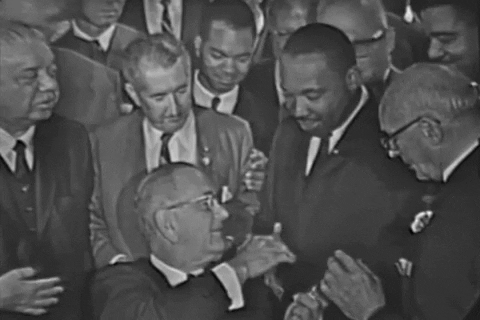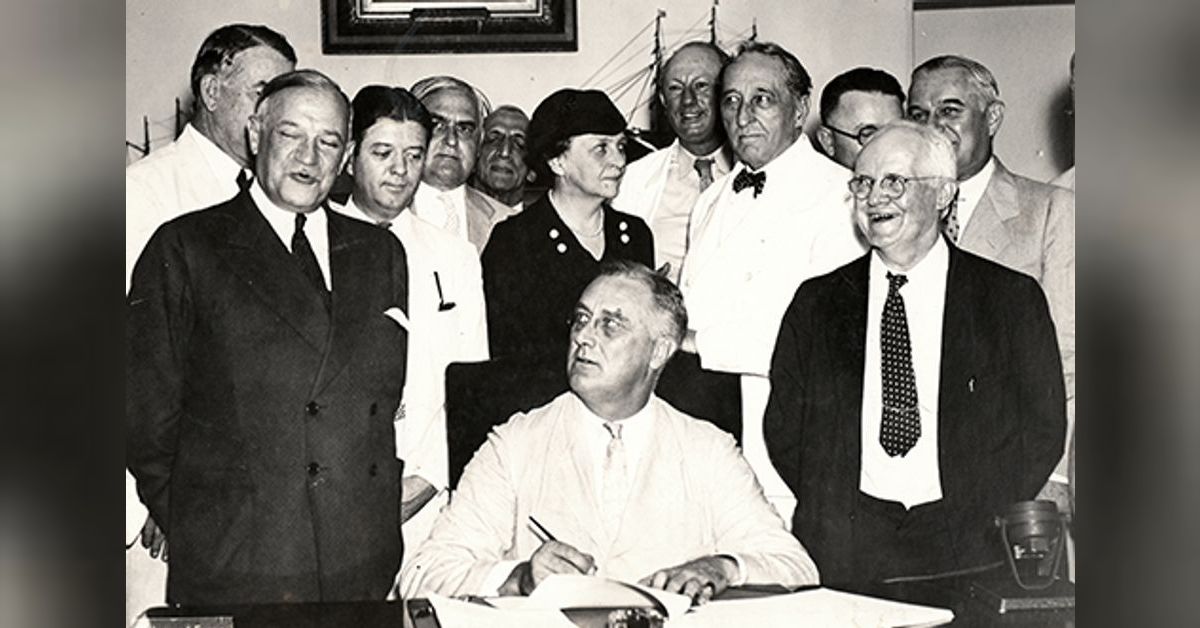The Civil Rights Act of 1964

Introduced by: President John F. Kennedy
Passed by: Lyndon Johnson
Year: 1964
The situation: President John F Kennedy introduced the bill in 1963 but when the bill reached the Senate it was opposed by a filibuster. After President Kennedy was assassinated President Johnson pushed the bill forward.
BTW: the bill was filibustered again, for 72 days to be exact.
It was signed into law on July 2, 1964 almost a full year after President Kennedy introduced the bill!
The impact: discrimination based on race, religion, sex, and national origin was outlawed. It also prohibited racial segregation in schools / public, unequal voter registration requirements, and employment discrimination.
11 total titles make up the legislation with Title VII focused on employment opportunity.
Title VII: Equal Employment Opportunity
This title focuses on employment discrimination based on race, color, religion, sex or national origin and applies to employers who have 15 or more employees who have worked for 20 or more weeks. It also prohibits discrimination based on association with an individual of a particular race, religion, sex, or national origin.
The Equal Employment Opportunity Commision (EEOC) was established via the act to enforce the federal laws as well as investigate any claims of discrimination based on:
- Race
- Color
- National Origin
- Religion
- Sex (orientation, pregnancy and gender identity)
- Age
- Disability
- Genetic Information
BTW: it is also against the law to discriminate against a person who complains about discrimination or has filed a charge of discrimination!
FYI: Retaliation continues to be the most cited claim when charges are filed with the EEOC followed by disability, race and sex.
The bottom line: an employer cannot take “adverse employment action” like refusing to hire, demoting, refusing to promote or firing against an employee or potential employee based on any of the factors listed above. If the employer does then the employee may have a discrimination claim.
The Family Medical and Leave Act of 1993

Introduced by: President Bill Clinton
Year: 1993
JOIN 130K+ HR LEADERS
Get insights, learnings, and advice on how to build companies and cultures that people actually love.
No spam. Unsubscribe any time.
The situation: Prior to Clinton’s term a family medical leave act was vetoed twice by former President George H.W. Bush. At the time the workforce was experiencing rapid growth as more women were joining. There was a desire to support the working class who wanted to have a family and/or needed time for illness related instances.
The impact: Eligible employees can take up to 12 weeks of job protected unpaid leave during a 12-month period to:
- Birth and care for a newborn child
- For placement of a child from adoption or foster care
- Care for an immediate (spouse, child, parent) ill family member
- Recover from a serious illness
Employees are eligible if:
- Worked for the employer for at least 12 months
- Have worked at least 1,250 hours over the past 12 months
- Employer must employ 50 or more employees within 75 miles (federal), several states have enacted different thresholds
- Work for a covered employer
To note: 12 states have passed laws to provide additional protections for workers. This FAQ covers frequently asked questions when it comes to FMLA.
BTW: The US is 1 OF 6 countries in the world that does not offer paid parental leave. I covered how to support working moms & what we get wrong about parental leave in previous editions of I Hate it Here.
The bottom line: FMLA is not enough and many employees are not eligible or cannot afford to take unpaid leave. While some have access to paid leave through their employer there is a gap here and there are serious implications for women and certain racial groups.
The Fair Labor Standards Act of 1938

Introduced by: President Franklin D. Roosevelt
Year: 1938
The situation: The Great Depression had left many Americans without jobs or access to income or in unsafe working conditions. Employers were taking advantage of the workers and working conditions were terrible. Unemployment had skyrocketed to 25% and the economy was suffering. The FLSA was part of the New Deal legislation and focused on ensuring all who could work would have access to better working conditions.
The 4 main provisions of FLSA:
- Federal standards for minimum wage
- Overtime
- Child labor laws
- Employer recordkeeping
Ever wondered where our 40-hour work week came from? You can thank the FLSA! As part of the provision around overtime, employers were required to pay overtime for employees who worked over 44 hours a week. An amendment 2 years later reduced overtime to anything over 40-hours. Voilà, the birth of the 40-hour work week.
BTW: When the bill was first introduced a 30-hour work week was floated as the standard. Ah, the dream.
The impact: The bill set the minimum wage to .40 cents, a maximum 40 hour work week and a minimum age of 16 in certain industries. Working conditions were improved and workers and their rights were protected.
To note: Since then states have passed their own laws regarding minimum wage.
The bottom line: At the core of this legislation is ensuring workers are not being abused. The legislation has evolved over the years.
Additional Laws:

If you’re curious like me I included this section for you! There are so many important laws in the history of the US that have impacted employees and employers.
And the laws mentioned above have also had several amendments since their inception! Our legal system can be confusing but I hope the details I mentioned above are helpful.
Check these additional laws out:
- Lilly Ledbetter Fair Pay Act: aims to stop discriminatory compensation practices and eliminated the normal filing period
- National Labor Relations Act of 1935: unions, collective bargaining and strikes
- Social Security Act: established payroll taxes and the revenue from that funds Social Security, Medicare, unemployment insurance and other programs.


